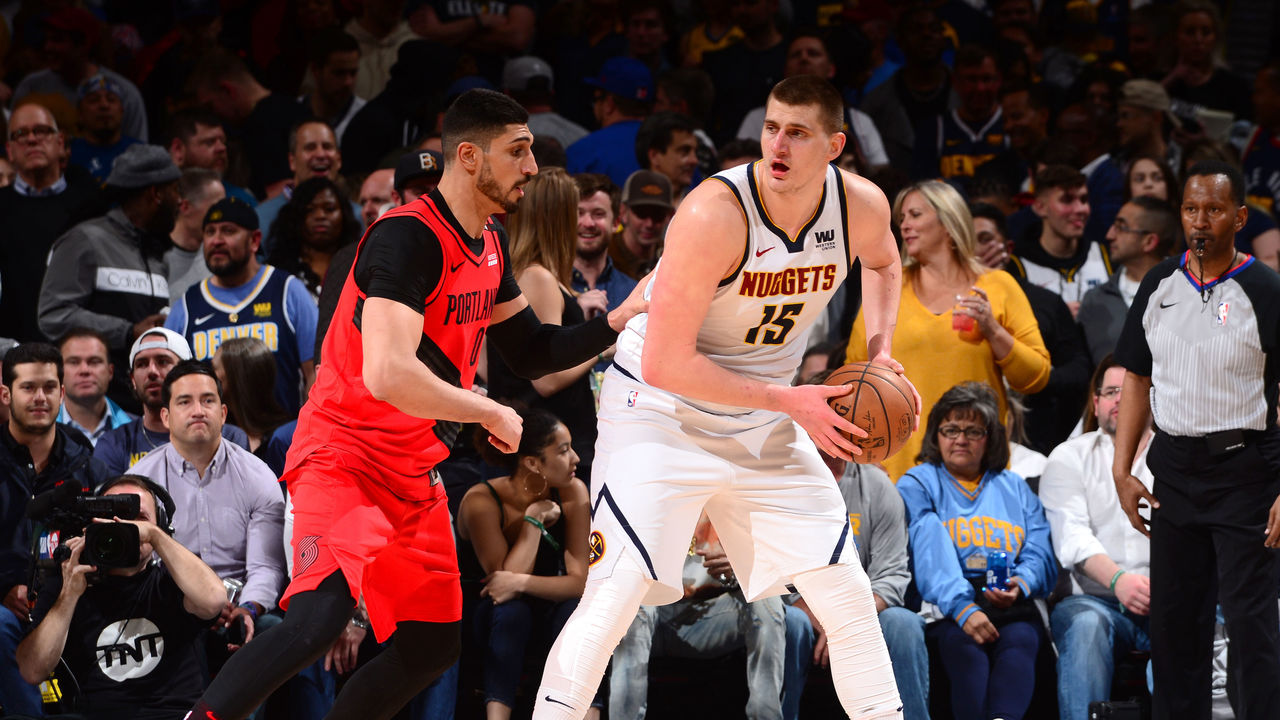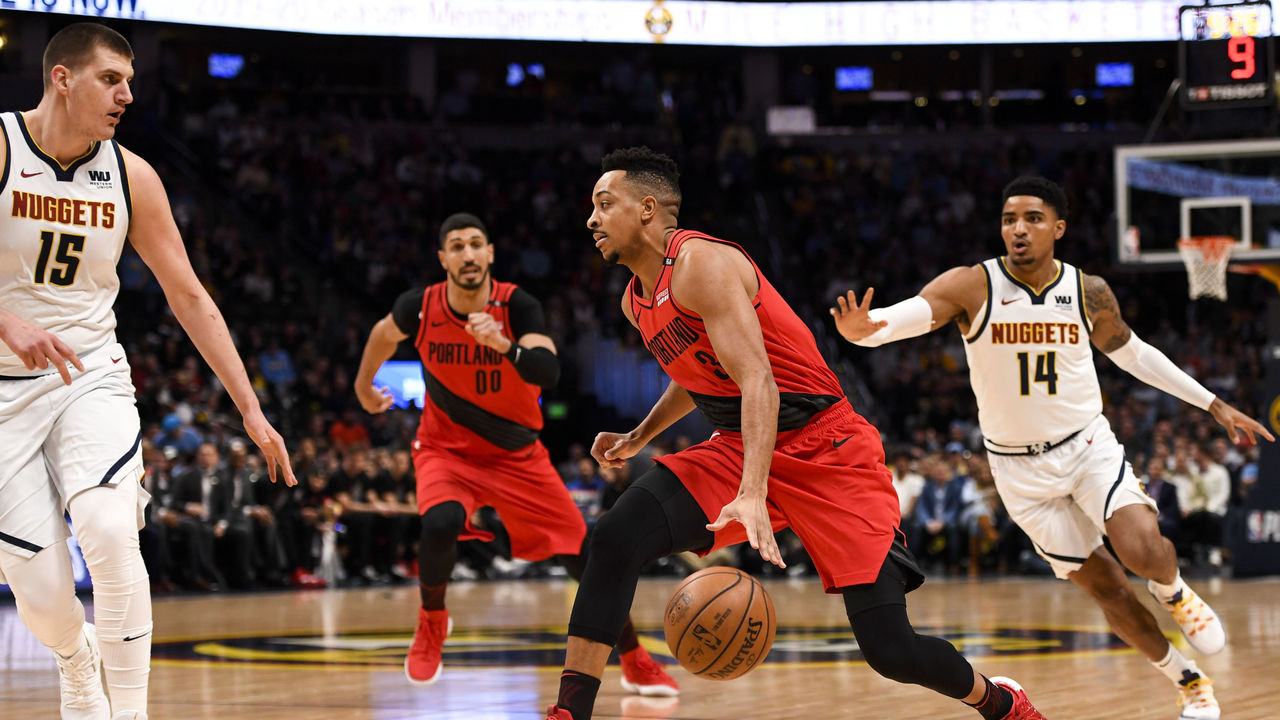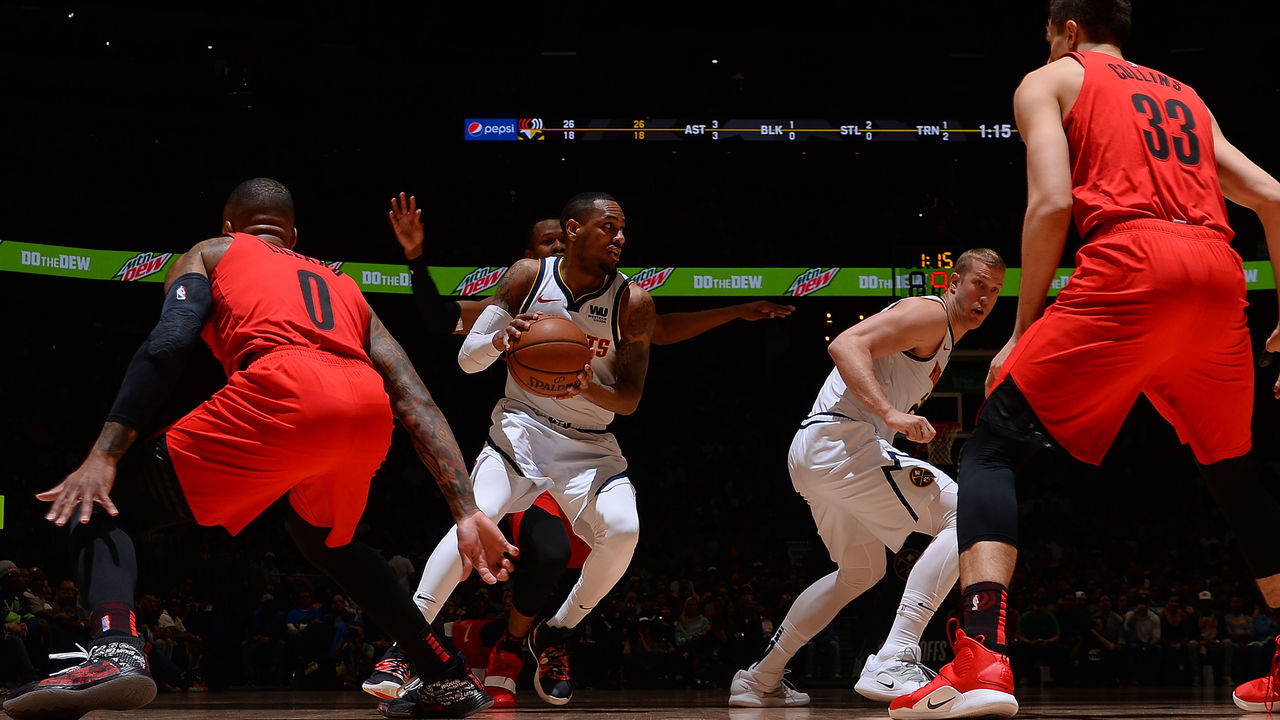4 thoughts on Blazers-Nuggets as the series swings back to Portland
If it feels like most of the NBA's remaining playoff participants have a ton at stake - be it history, proof of concept, the futures of soon-to-be free agents, or the opportunity to squeeze through a narrowing championship window - the Denver Nuggets and Portland Trail Blazers, by contrast, seem to be playing with house money.
That's not to say winning their second-round series wouldn't be hugely meaningful for either team. But unlike the rest of the playoff field, both have already banked what should be defined as successful seasons.
Fortunately, the comparatively soft stakes haven't sapped the Northwest Division clash of any intrigue. It's a tactically and stylistically interesting matchup with very little separating the teams. Two games in Denver produced a split, sending the series back to Portland to kick off what's now a best-of-five.
Here are four thoughts on the series so far:
Portland has no solution for Jokic

We knew the Blazers would have their hands full with Nikola Jokic. That's been true of every team that's faced the Nuggets this season, but Portland's rickety front line figured to be particularly overmatched against the uber-skilled big man. Games 1 and 2 did not offer much evidence to the contrary.
Yes, the Blazers held Jokic to just 16 points on 19 shooting possessions in Game 2 after he went off for 37 on 24 in Game 1. But their adjustments, which largely focused on limiting his scoring and making him more of a passer, only worked because Denver's shooters repeatedly failed to convert the clean looks Jokic routinely created for them out of double-teams. During the game, the Nuggets attempted 18 threes that were classified as "wide open," but hit only four of them. Jokic finished with seven dimes, but had 20 potential assists. In that sense, the Blazer got lucky.
The "make anyone but that guy beat you" strategy can be successful in spurts, especially against an inexperienced team in the playoffs. Long term, though, throwing extra bodies at a playmaker as gifted as Jokic is a losing gambit. His vision and anticipation are so sharp, and his passes are so precise, that even just stunting toward him from the perimeter can be death.
But what's the alternative? The Blazers don't have anyone who can contain Jokic one-on-one, so they're always going to be choosing from a buffet of unsavory options. Enes Kanter has held up reasonably well in the post, but things get dicey when Jokic is operating on the perimeter. Kanter struggles defending in space and can't switch onto smaller players against screens and handoffs, but dropping him back leaves Portland vulnerable to Jokic's pick-and-pop jumper and feathery floater.
Zach Collins and Meyers Leonard offer a bit more mobility at the center spot, but Collins is too handsy and Leonard is just an all-around poor interior defender. In the fourth quarter of Game 1, the Blazers experimented with Al-Farouq Aminu on Jokic and Moe Harkless on Jamal Murray to provide the option of switching the two-man actions Denver spammed all night. It didn't really work, though, and produced a bunch of fouls as Jokic repeatedly took those smaller defenders into the post. The Blazers did not attempt that coverage in Game 2.
One wrinkle the Blazers did use more frequently in Game 2 was sending two defenders to the ball on the Nuggets' corner handoff sets, in hopes of buying time and denying Jokic the ball on the roll. It worked on a few occasions, forcing resets while the shot clock ticked down. But when the Nuggets were able to slip Jokic the ball, things did not end well for Portland.
Any of these tactics can work situationally, and Portland will keep trying variations of all this stuff. But Jokic is going to continue being a massive problem for the Blazers without an evident solution. In the first two games, the Nuggets were 49.8 points per 100 possessions better with him on the floor.
McCollum taking pressure off Lillard
Damian Lillard has justifiably gotten the plaudits for Portland's postseason run to date, but CJ McCollum has been outstanding in his own right. And with Lillard scuffling through his worst outing of the playoffs in Game 2, McCollum stepped up down the stretch and carried the Blazers home.

His stat line - 20 points (on 21 shooting possessions), six rebounds, and six assists - doesn't leap off the page. It also undersells the stabilizing impact McCollum had, the steady way he ran the offense when Lillard was on the bench or being face-guarded away from the ball, and the timeliness of some of his jump shots, several of which came when the game seemed to be slipping away from the Blazers.
All told, McCollum played 41 minutes, was a game-high plus-11, and showcased workmanlike playmaking chops that too often lie dormant. At times like this - fleeting, glorious times - the sixth-year guard is good enough to look like an alpha.
Thanks to McCollum, the Blazers' offense has stayed afloat when Lillard has gone to the bench in this series (whereas it's totally collapsed without McCollum in the game). He doesn't possess Lillard's mastery of the pick-and-roll, but on his best days, he can cook any coverage. Drop back and he'll hit you with one of the game's deadliest floaters or a buttery mid-range pull-up. Play up on him and he'll turn the corner or veer away from the screen and burst into the lane. McCollum, like Lillard, has gotten better at recognizing and breaking traps, and he's done a really nice job of splitting Denver's doubles:
Portland's fate in this series still rests primarily on Lillard's shoulders, but his life gets so much easier when his co-star is scoring and playmaking like this. There's a natural pressure release when McCollum is clicking and the two are working in synchronicity. The ball swings from one side of the floor to the other, and from one pick-and-roll into the next. Secondary playmaking is doubly important against a pressuring defense like Denver's, which will often sell out to stymie your initial action.
Being that secondary creator is a constant balancing act between deference and assertion, and McCollum has been navigating that balance perfectly in this series.
Kanter a positive at both ends (for now)
Even as we point out his limitations, we need to acknowledge how instrumental Kanter has been, and continues to be, to Portland's success. You can focus on all the ways he isn't Jusuf Nurkic, or you can think about how much trouble the Blazers would be in if Collins and Leonard comprised their whole center rotation.
As it stands, Kanter is the team's best (only?) post player, and his offense might actually be its best defense against Jokic. He can make Jokic work, and saddled the Denver star with five fouls in Game 2. For the series, Kanter has shot 16-of-24 from the field and 9-of-9 from the line - and he's done it with one working arm after separating his left shoulder during Portland's series-clinching win in the first round.
Given the injury, it's a credit to Kanter's guile that the Nuggets haven't been able to prevent him from getting to his right hand, knowing full well that he can't go up with his left. Even when he's been on the wrong side of the basket, Kanter's managed to sneak his right arm underneath for scoop layups or has gotten to the other side for reverses.
There's also the vital work he's been doing to create space for Lillard and McCollum as a screener, specifically with these canny re-screen actions that allow Lillard to pull up for threes with enough separation from both the screen defender and the on-ball defender:
More surprisingly, Kanter was pretty solid defensively in Game 2, in spite of some missed box-outs in the fourth quarter. Post defense has never really been his issue, and Jokic couldn't do a whole lot against him with his back to the basket. Kanter was as physical as the referees allowed him to be, refused to let Jokic dislodge him, and showed off some impressive handwork with a couple nice swipes from behind:
Small-sample caveats apply, but the Nuggets are also shooting just 50 percent at the rim against Kanter so far, an elite mark.
Sustainability, of course, is another matter. Denver should probably stop trying to attack Kanter in the post and focus on running him through as many high pick-and-rolls as possible.
At the other end, the Nuggets can probably work harder to force him left. They also need to try to make him a passer whenever possible. It's not that Kanter can't make plays out of the post or the short roll, but he's almost always focused on one side of the floor and doesn't tend to recognize where the help is coming from. Even in this series, he's missed a few opportunities to hit open shooters that he would've seen if he'd turned his head 45 degrees.
It's not inconceivable that Kanter still winds up looking unplayable in this matchup before the series is over, but for now, he's making a positive impact at both ends of the floor. Wild.
Denver needs more from its bench

The Nuggets' bench has been a major strength for them all year, and it was one of the biggest reasons they earned the West's 2-seed despite a slew of injuries throughout the regular season.
But ever since Torrey Craig took Will Barton's place in the starting lineup midway through the first round, Denver's reserves - with the exception of Malik Beasley - have been a colossal disappointment. The team's transitional lineups have been getting destroyed by Portland's, and it's not like the Blazers' bench is a murderer's row. Beasley's done everything the Nuggets have needed from him - defending, hitting threes, attacking off the catch, and getting to the rim - but everyone else coming off the bench has seemingly lost the ability to do the things they're best at.
Monte Morris, who shot better than 41 percent from 3-point range during a breakout regular season, has seen his jumper and his confidence abandon him. He's missed all 11 threes he's taken in the playoffs, and he's hit just three field goals through two games against the Blazers. Mason Plumlee, whose defense powered the second unit all year, has been unable to keep ball-handlers in front of him and hasn't made much of an impact at the rim. Barton's looked broken since the playoffs began, and has seemingly forgotten how to put the ball in the basket. The Nuggets couldn't even outscore a Blazers five-man reserve unit that curiously made a five-minute appearance in the second quarter of Game 1.
Rodney Hood has basically outplayed the entire Nuggets bench on his own, providing the Blazers with some much-needed self-creation off the dribble and a couple big-time threes, including a backbreaker late in Game 2. That much, at least, seems unlikely to continue.
But Denver's reserves still need to be better. This is a series that features two tightly matched starting lineups, and the Nuggets' bench figured to be an advantage coming in. At this point, it just needs to avoid being a liability.
(Advanced stats courtesy NBA.com)